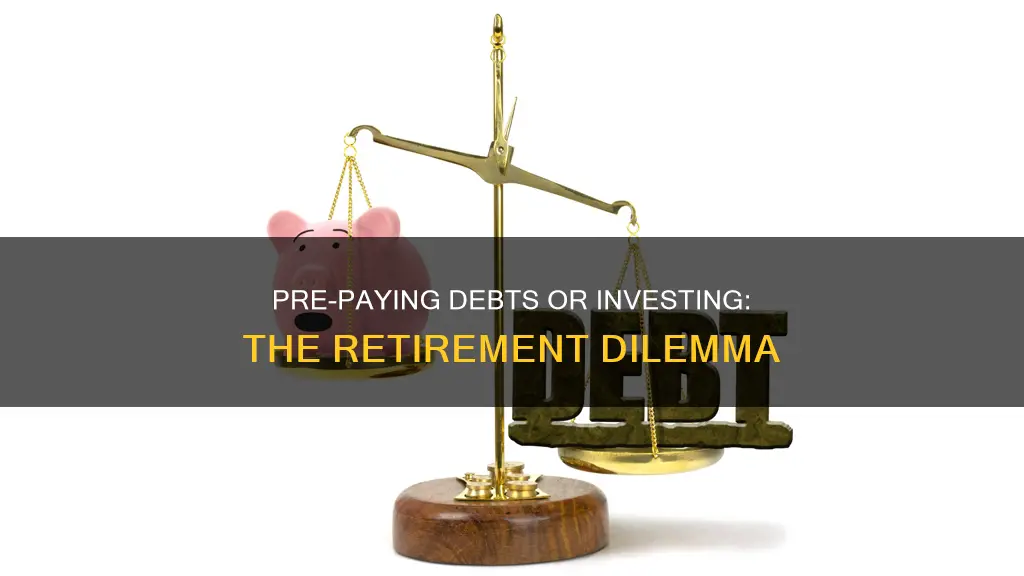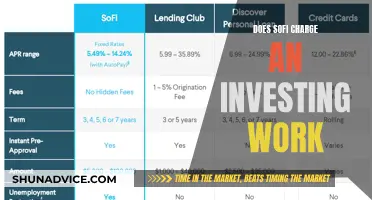
Whether to pre-pay debts or continue to invest before retirement is a complex decision that depends on various factors, including the type of debt, interest rates, potential investment returns, individual financial goals, and emotional considerations.
On the one hand, paying off high-interest debt, such as credit cards, can improve one's financial situation and provide emotional benefits. On the other hand, continuing to invest in retirement accounts can take advantage of compound interest and potential employer matching contributions.
A balanced approach is often recommended, where individuals contribute to debt repayment, retirement savings, and an emergency fund simultaneously. Ultimately, the decision should be personalised to one's unique financial circumstances and priorities.
| Characteristics | Values |
|---|---|
| Should I pre-pay debts or continue to invest? | It depends on various factors, including the type of debt, interest rates, potential investment returns, and individual financial goals. |
| Type of debt | If you have high-interest debt (e.g. credit card debt), it is generally recommended to pay it off first. Low-interest debt (e.g. home loans, student loans, car loans) can often be managed alongside investing. |
| Interest rates | Compare the interest rates of your debt to potential investment returns. If you can invest your money at a higher rate of return than the interest rate on your debt, investing may be more beneficial. |
| Individual financial goals | Consider your emotional and psychological relationship with debt and investing. Some people prefer the peace of mind of being debt-free, while others may prioritize the potential for higher returns from investing. |
| Retirement savings | If your employer offers retirement savings benefits (e.g. 401(k) matching contributions), it is often recommended to take advantage of these before focusing on paying off debt. |
| Emergency fund | It is generally advisable to have an emergency fund of three to six months' living expenses before focusing solely on debt repayment or investing. |
What You'll Learn

Weigh up the interest rates of your debt against potential investment returns
Weighing up the interest rates of your debt against potential investment returns is a tricky but important task. It's a very personal decision, and there are several factors to consider.
Firstly, it's important to understand the interest rates you're paying on your debts. Make a list of your debts, including the interest rates and minimum monthly payments for each. Credit card debt often has high interest rates, so it's a good idea to focus on paying this off first. The U.S. Securities and Exchange Commission recommends prioritizing debts with an interest rate of 8% or higher and no tax advantages.
Next, consider the potential returns on your investments. Historically, the average rate of return for stock market investments is around 10%. If you invest in the stock market, there's a chance you'll earn more than the interest you're paying on your debts. However, investing in the stock market also carries risks, as the market can be volatile.
Another factor to consider is your timeline. If you're investing for retirement, it's generally better to start sooner rather than later to take advantage of compound interest. On the other hand, if you're nearing retirement age, paying off your debts may be a more pressing concern.
It's also essential to ensure you're meeting your basic financial obligations before deciding between investing and paying off debt. This includes making minimum debt payments, building an emergency fund, and capturing any employer match on retirement contributions.
Finally, it's worth noting that paying off debt provides a guaranteed return in the form of the interest you'll save, while investing carries the risk of losing money.
In general, if the interest rate on your debt is higher than the potential return on your investments, it's a good idea to prioritize paying off that debt. However, if the potential investment returns are higher, investing may be the better option. Ultimately, the decision depends on your individual financial situation and risk tolerance.
Green Buildings: Smart Investment, Healthy Future
You may want to see also

Consider the emotional and financial implications of debt in retirement
The decision to pre-pay debts or continue investing before retirement has emotional and financial implications. On the one hand, paying off debt improves your financial situation and provides peace of mind, especially for those who rest easier at night knowing they have no extra bills to take care of. On the other hand, paying off debt to the detriment of your investment accounts can create more emotional strain in the long run.
High-interest debt, such as credit card debt, can be detrimental to your financial security and overall well-being. The stress and anxiety associated with high-interest debt can lead to various negative effects on mental health, including denial, anger, depression, and impaired cognitive functioning. It is important to prioritize paying off these types of debts before retirement to reduce the risk of financial distress.
However, low-cost loans, such as home loans, may be more manageable, especially if you have sufficient income to make the payments. It is crucial to find a balance between paying off debt and investing to optimize your long-term financial outcomes. Seeking financial advice from a professional can help you make informed decisions about your specific situation.
Additionally, it is essential to consider the opportunity cost of paying off low-interest debt. For example, contributing extra income to a retirement account, such as a 401(k) or IRA, may provide a higher return on investment than the interest saved by paying off a low-interest loan. Moreover, some forms of debt, such as mortgage interest and student loan interest, offer tax advantages that further reduce the effective interest rate.
In conclusion, when deciding whether to pre-pay debts or continue investing before retirement, it is crucial to consider both the emotional and financial implications. Paying off high-interest debt can improve your financial situation and reduce stress, while the opportunity cost of paying off low-interest debt may be higher than the potential gains. Seeking financial advice can help you make informed decisions and find a balance that suits your circumstances.
Investing Strategies During Economic Downturn
You may want to see also

Prioritise high-interest debt
If you have high-interest debt, such as credit card debt, it's best to focus on paying this off first. Credit cards can have interest rates as high as 30%, and even low-interest debt, like mortgages and federal student loans, can be costly over time.
The "debt avalanche" method is a popular strategy for paying off high-interest debt. This involves making a list of all your debts, including credit cards, personal loans, student loans, and auto loans, along with their interest rates, balances, and minimum monthly payments. Once you have this information, you can start by paying off the debt with the highest interest rate first while continuing to make minimum payments on all your other debts. This approach can save you the most time and money in the long run, as you'll be paying less interest overall.
Another strategy is the "snowball" method, where you focus on paying off the debt with the smallest balance first. This can help build motivation and provide quick wins, but it may cost you more in total interest payments over time if your larger debts have higher interest rates.
It's also important to note that some debts, like court judgment debt and criminal justice debt, can have immediate and severe consequences for non-payment. Therefore, it's crucial to prioritise these debts as well.
Additionally, if you have access to a 401(k) match or similar retirement savings plan through your employer, it's generally recommended to contribute at least enough to take advantage of this benefit. This is essentially "free money" and can provide a higher return than paying off some types of debt.
Overall, by prioritising high-interest debt and taking advantage of employer-matching retirement plans, you can make the most of your money and work towards achieving financial security.
Investment Bankers: Why All the Hate?
You may want to see also

Understand the tax advantages of certain debts
When deciding whether to pre-pay debts or continue investing, it is important to understand the tax advantages of certain debts. Here are four to six paragraphs explaining these advantages:
Debt financing offers tax benefits that make it a more attractive option than equity financing. Interest charges on debt are tax-deductible, reducing the overall cost of borrowing. This is because the interest paid is considered a business expense, as long as it is used for business purposes and certain other conditions are met. This deduction is available for all types of small businesses, including sole proprietorships, partnerships, and S corporations.
In contrast, equity financing costs are not tax-deductible. Dividend payments and returns of capital are taxed twice: once on the corporation's business return and again when distributed to investors. This makes debt financing more favourable from a tax perspective and encourages businesses to take on more debt.
The tax treatment of debt and equity can also impact a company's capital structure. By reducing the tax advantages of debt, companies may be incentivised to improve their capital buffers and reduce leverage. This could enhance financial stability and reduce systemic risk.
Additionally, debt financing allows businesses to retain full control over their operations. With equity financing, businesses must give up a percentage of ownership, which can dilute decision-making authority. Lenders, on the other hand, have no say in how the business is run as long as loan payments are made on time.
Interest payments on debt can also help build or improve a business's credit score. Timely payments demonstrate financial responsibility and improve the business's creditworthiness. This can lead to better financing opportunities in the future.
SEO Investment: When to Take the Plunge?
You may want to see also

Assess your budget and spending
When deciding whether to pre-pay debts or continue investing, assessing your budget and spending is crucial. Here are some detailed steps to help you through the process:
Understand Your Income:
Start by calculating your after-tax or net income, which is the amount you receive after deductions such as taxes. This will be the foundation for allocating your budget according to the 50/30/20 rule or other budgeting methods.
Identify Your Critical Costs:
These are the expenses that are essential for your daily living and cannot be avoided. They include rent or mortgage payments, utilities, groceries, transportation costs, insurance premiums, and debt repayments. Since these costs tend to be the largest portion of your budget, it's important to be mindful of them and try to find ways to reduce them if possible.
Separate Needs from Wants:
Under the 50/30/20 budget rule, about 50% of your after-tax income should be allocated to needs. These are the bills you must pay and the things necessary for survival. If your essential expenses exceed 50%, you may need to cut down on "wants" or consider downsizing your lifestyle, such as opting for a more affordable car or cooking at home instead of dining out frequently.
Evaluate Your Wants:
Wants are all the things you spend money on that are not absolutely essential. This includes dining out, vacations, entertainment, and upgrades you choose, such as buying a luxury car instead of an economical one. While it's important to treat yourself occasionally, be mindful of your budget and try not to exceed the 30% allocation for wants.
Track Your Expenses:
To get a clear picture of your spending habits, track your expenses for a few months. Use budgeting apps or spreadsheets to categorize your spending into needs, wants, and savings. This will help you understand how well your current spending aligns with the 50/30/20 budget rule and identify areas where you may need to cut back.
Automate Your Savings:
Set up automatic monthly transfers from your checking account to your savings and investment accounts. This ensures that your savings grow steadily without requiring manual effort. Automating your savings makes it easier to focus on other aspects of your budget and financial goals.
Maintain Consistency:
Stick to your budget and spending strategy over time. Consistency is key to the success of any budget. Review your budget regularly, such as once a quarter, to ensure it aligns with your income, expenses, and financial priorities. Adjust your budget as needed to accommodate changes in your financial situation or goals.
Navigating the Legal Landscape: Paying Finder's Fees for Investment Referrals
You may want to see also
Frequently asked questions
Paying off high-interest debt, such as credit cards, can improve your financial situation. It can also be beneficial for your peace of mind, as some people prefer to know they don't have extra bills to take care of every month.
Investing early in your life impacts your long-term retirement success. Retirement savings can benefit from compound interest, which means the money you invest today will grow and be worth more by the time you retire.
The type of debt, interest rates, potential investment returns, and individual financial goals. For example, if you have high-interest credit card debt, it makes sense to pay that off before saving or investing as you're unlikely to get a higher return by investing the money.
If your company offers retirement savings benefits, take advantage of them. Contribute to your retirement fund, especially if your employer matches your contributions. At the same time, make sure you're at least making the minimum payments on any debts and try to pay off high-interest debt as quickly as possible.







